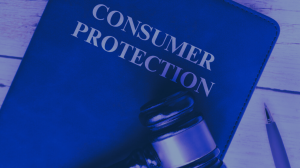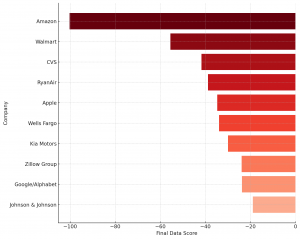Permutable AI highlights companies with most negative consumer protection sentiment: Amazon, Walmart, CVS ranked worst
Permutable AI unveils insights on companies with lowest consumer protection sentiment scores, highlighting the need for ethical practices.
LONDON, LONDON, UNITED KINGDOM, March 5, 2024 /EINPresswire.com/ -- Permutable AI has conducted a study, known as sentiment analysis, to see which companies people think are not protecting their rights as consumers. This research helps us understand how these companies are seen around the world when it comes to respecting consumer rights.The analysis leverages cutting-edge AI and sentiment analysis technologies, scrutinizing vast amounts of data across an average of 10,000 sources and 500,000 articles daily to assess public and market opinion on corporate consumer protection practices.
The analysis, encompassing a range of industries from internet services and retail to pharmaceuticals and airlines, has highlighted significant consumer concerns. The companies with the most negative sentiment scores, according to Permutable AI’s findings, are as follows:
1. Amazon (E-commerce) - Final data score: -100.27
2. Walmart (Retail) - Final data score: -55.53
3. CVS (Retail/Pharmaceuticals) - Final data score: -41.7
4. RyanAir (Airlines) - Final data score: -38.83
5. Apple (Tech) - Final data score: -34.71
6. Wells Fargo (Banking) - Final data score: -33.9
7. Kia Motors (Automotive) - Final data score: -29.96
8. Zillow Group (Real Estate) - Final data score: -23.89
9. Google/ Alphabet (Internet) - Final data score: -23.8
10. Johnson & Johnson (Pharmaceuticals/Consumer Health) - Final data score: -18.91
Key areas of concern
Amazon: Concerns about counterfeit products being sold on their platform and allegations of manipulating search results to favour their own products have eroded trust with some consumers.
Walmart: Walmart has been involved in numerous product recalls due to safety concerns as well as being accused of misleading customers with false advertising, "rollback" pricing that may not reflect actual savings, and price discrimination based on location.
CVS Health: The pharmacy chain has been criticized for its complex pricing structure and its handling of customer data, raising concerns about transparency and privacy.
Ryanair: The airline is known for its aggressive cost-cutting measures, which often translate to poor customer service and hidden fees, leading to frustration and dissatisfaction among travelers.
Apple: The tech giant has been criticized for its restrictive repair policies that make it difficult and expensive for consumers to repair their own devices, and for practices like planned obsolescence, where products are designed to become obsolete quickly, encouraging frequent upgrades.
Wells Fargo: The bank has been working to regain trust after a massive scandal involving fraudulent accounts opened by employees without customer consent. Additionally, past practices regarding excessive fees continue to tarnish their reputation.
Kia Motors: The auto manufacturer has faced safety recalls for some of its vehicles and concerns about the warranty coverage offered to customers, raising questions about their commitment to consumer safety.
Zillow: The online real estate marketplace has been under scrutiny for the accuracy of its valuations and its data use practices, leading to concerns about reliability and potential ethical violations.
Google/Alphabet: The tech giant continues to face challenges related to data privacy and potential bias in its search algorithms, requiring ongoing efforts to demonstrate transparency and fairness in its practices.
Johnson & Johnson: The pharmaceutical company has been involved in several high-profile legal challenges related to the safety of its products, which has significantly damaged its brand image and requires significant effort to regain consumer trust.
These findings serve a crucial reminder that in today’s business landscape, consumer trust is not just an asset but a necessity creating loyalty and brand value. In a market saturated with options, trust distinguishes brands, driving consumers to choose one over another as well as being critical for crisis management. Ultimately, trust translates into sustained business success and competitive advantage.
Wilson Chan, CEO of Permutable AI, commented on the findings: "This analysis highlights the critical role of consumer protection in maintaining brand integrity and trust. Companies must actively address these concerns to foster a positive relationship with their consumers. At Permutable AI, we're committed to leveraging our technology to shed light on these important issues, guiding companies towards more ethical and consumer-friendly practices."
Talya Stone, CMO at Permutable AI highlighted: "In today's digital era, the essence of consumer trust has never been more critical. Our findings not only spotlight the imperative of consumer protection but also serve as a call to action for businesses to realign their practices with the evolving expectations of society. As we navigate through the complexities of consumer sentiment, let us remember that at the heart of every transaction lies the foundational pillar of trust."
Methodology:
Permutable AI's analysis is rooted in a sophisticated methodology designed to capture a wide spectrum of sentiment towards companies, in this case specifically regarding consumer protection. The dataset encompassed on average 500,000 articles scanned daily, ensuring a comprehensive and current representation of market sentiments.
Sentiment analysis was meticulously conducted on textual data from articles related to each company, assessing overall sentiment—positive, negative, and neutral—towards the company in the media. The methodology involved identifying and quantifying specific positive and negative data points within the articles, offering a nuanced view of public perception.
A final sentiment score, ranging from -100 to 100 was then allocated to reflect an aggregate evaluation of each company's perceived performance in consumer protection. This scoring system is based on a balanced assessment, factoring in both positive and negative sentiments to provide a holistic view of each company's market perception.
To ensure robust and reliable analysis, companies with significant market influence were selected based on a minimum market capitalisation threshold of £10 million, with a minimum data cap in force to ensure substantial data coverage, enhancing the accuracy of the sentiment analysis.
"Our methodology aims not just to identify areas of concern but to foster a dialogue that encourages companies to adopt more sustainable and consumer-friendly practices," Chan adds. "By highlighting these issues, we hope to contribute to a more transparent, informed and ethical marketplace."
Mika Hererra
Permutable AI
mika@permutable.ai
Visit us on social media:
Facebook
Twitter
LinkedIn
Instagram
Legal Disclaimer:
EIN Presswire provides this news content "as is" without warranty of any kind. We do not accept any responsibility or liability for the accuracy, content, images, videos, licenses, completeness, legality, or reliability of the information contained in this article. If you have any complaints or copyright issues related to this article, kindly contact the author above.


